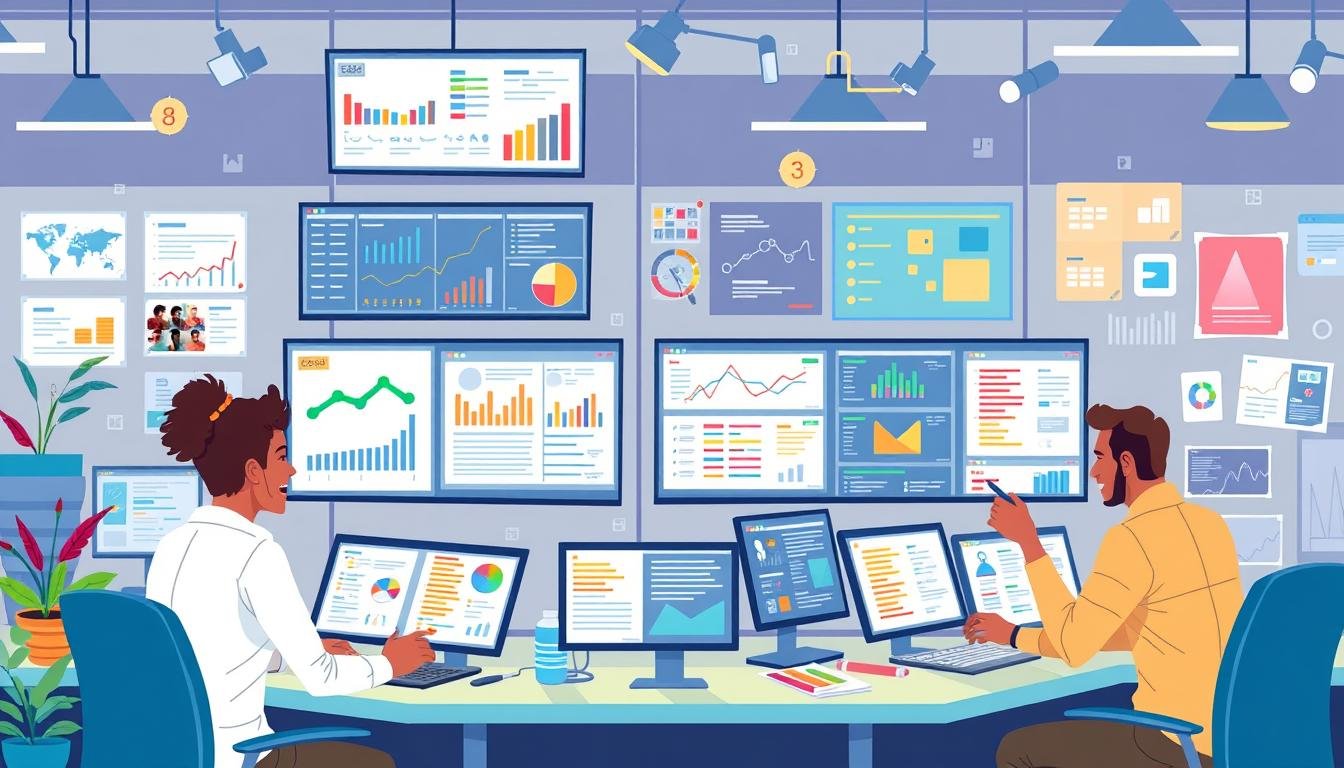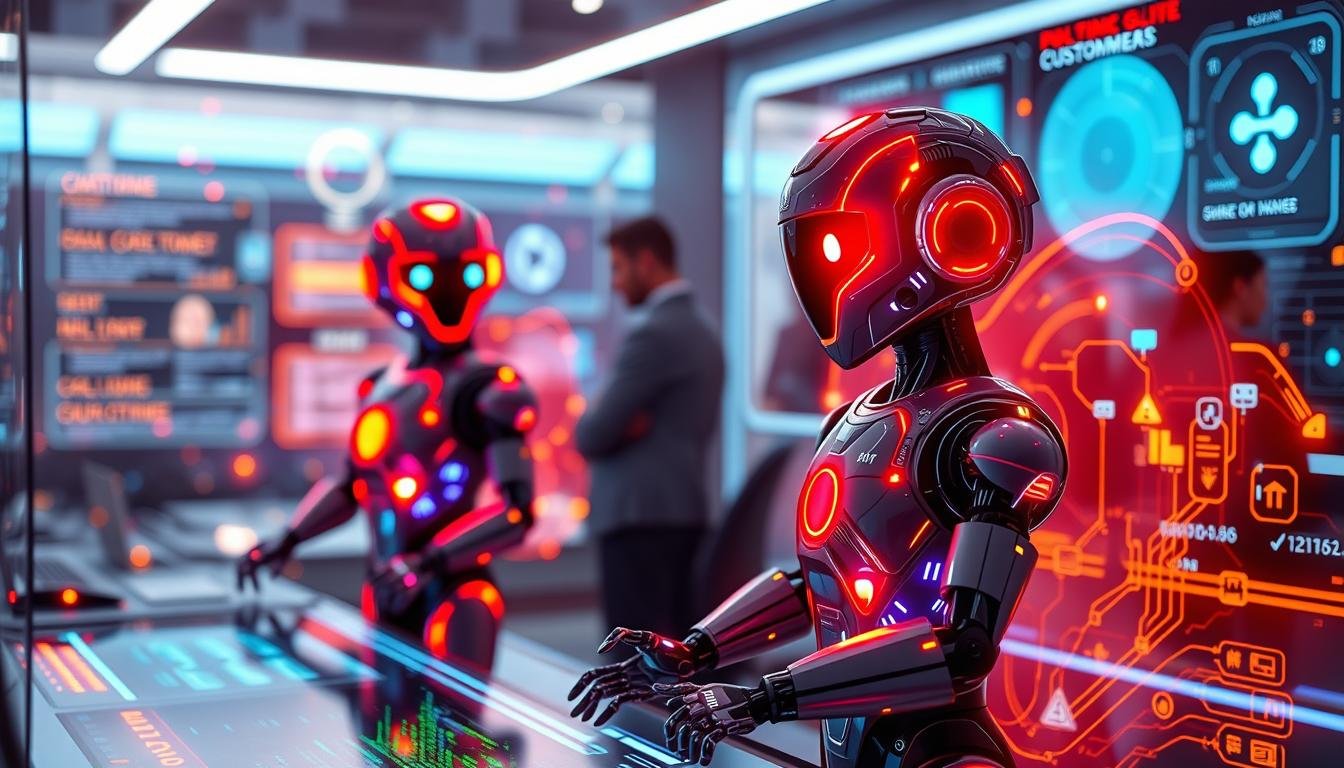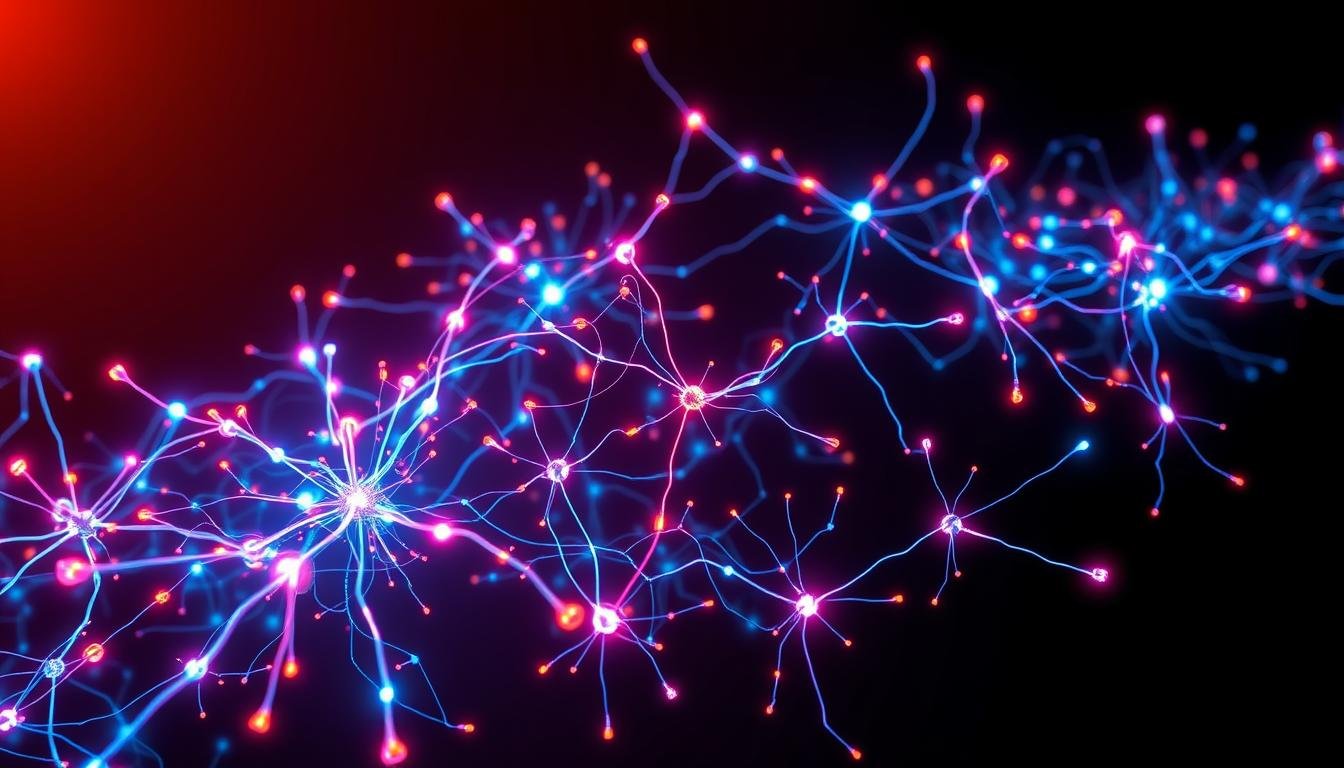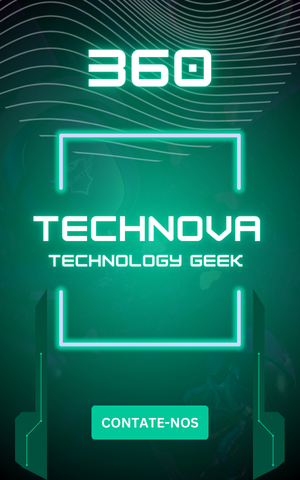In today’s fast world, staying healthy is tough. But, AI is changing how we keep track of our health. AI health apps give us personalized advice, meal plans, and fitness tips to reach our wellness goals.
The AI in healthcare market is booming. It’s expected to hit over $10 billion by 2032. These apps use AI to combine data from wearables, medical records, and our input. They give us a full picture of our health and well-being. AI apps make health monitoring easy, offer tailored care, and support us 24/7.
Key Takeaways
- AI-powered health apps revolutionize personal wellness monitoring by offering personalized insights, nutrition plans, and fitness coaching.
- These apps integrate data from wearables, medical records, and user input to provide a comprehensive view of an individual’s well-being.
- The AI healthcare market is expected to grow significantly, reaching over $10 billion by 2032.
- AI-powered health apps enhance accessibility to health monitoring, provide personalized care, and offer 24/7 support.
- These apps are valuable tools for maintaining overall health and wellness by leveraging the power of artificial intelligence.
Understanding the Revolution of AI in Personal Health Monitoring
Health apps have changed a lot, moving from simple tracking to advanced AI tools. These tools are changing how we monitor our health. They use artificial intelligence to offer smart symptom checkers, machine learning apps, and predictive analytics.
The Evolution of Health Apps
Health apps have grown a lot in recent years. They used to just count steps and track calories. Now, they use AI to give personalized advice and detect health issues early.
Benefits of AI Integration in Healthcare
AI in healthcare brings many benefits. AI apps can analyze data, find patterns, and give advice in real-time. This helps users take better care of themselves and make informed health choices.
Current Market Trends and Statistics
AI health apps are becoming more popular, especially for mental health and chronic disease management. Studies show AI can turn a patient’s medical record into a single number for diagnosis. AI tools are also outperforming humans in some medical tasks.
The future of health monitoring is all about AI. With more intelligent symptom checkers, machine learning health apps, and predictive health analytics, we’ll see big changes. Both individuals and healthcare providers will benefit from this technology.
Essential Features of AI-Powered Health Applications
The rise of artificial intelligence (AI) in healthcare has changed how we watch over and manage our health. AI health apps have key features that make them useful and help us stay healthy. They use AI to give us health tips, track our health signs, and spot diseases early.
These medical AI apps are great at looking at our health data and giving us advice on how to live better. They use machine learning to find patterns in our data. This helps us take care of ourselves better.
Another important feature is the virtual health assistants. They offer ongoing help and advice. These AI chatbots help with checking symptoms, send health messages, and book doctor visits. They make it easier to deal with the healthcare system.
Advanced AI health apps also have cool features like reminders for meds and activities. They analyze our sleep and fitness data and work with wearables. Some even use facial recognition and motion analysis for fitness coaching. This ensures we’re doing exercises right.
| Feature | Benefit |
|---|---|
| Personalized health recommendations | Tailored suggestions for lifestyle improvements, medication management, and preventive care |
| Real-time monitoring of vital signs and symptoms | Early detection of potential health issues and timely intervention |
| Predictive analytics for disease detection | Proactive approach to managing health conditions |
| Virtual health assistants | Continuous support, symptom checking, and healthcare messaging solutions |
| Integration with wearable devices | Comprehensive data collection and analysis for holistic health monitoring |
As the healthcare world gets more into artificial intelligence in healthcare, these smart medical companions are changing how we think about health. They help us be more involved in our health. This leads to a healthier future for all of us.
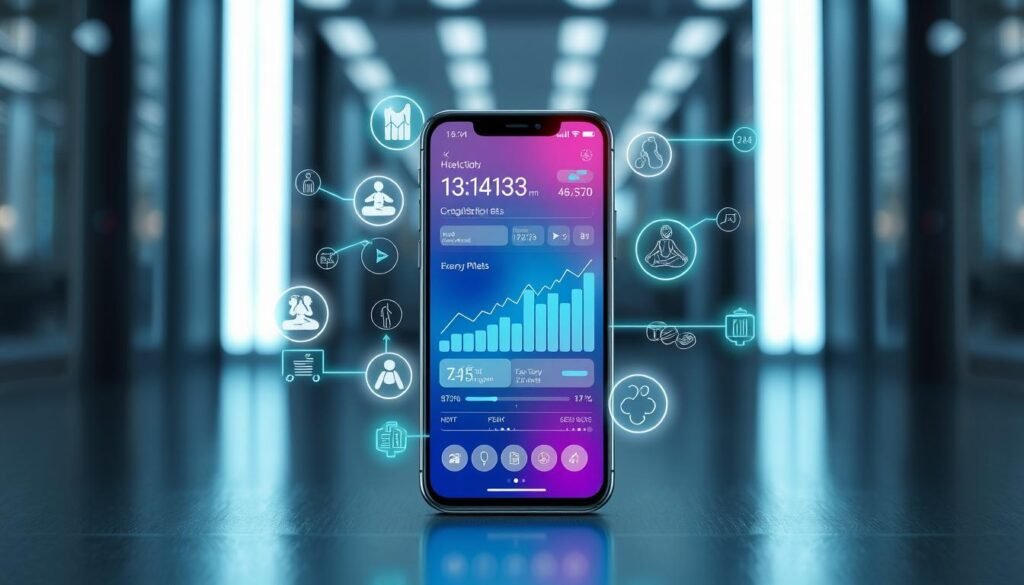
How to Use AI-Powered Health Apps to Monitor Your Well-being
AI-powered health apps have changed how we monitor our wellness. They offer a detailed and personal way to track your health. This includes everything from physical fitness to mental well-being. These apps use AI to understand your health better and suggest ways to reach your wellness goals.
Setting Up Your Digital Health Profile
To use AI health apps, start by setting up a digital health profile. You’ll need to enter your personal info, health history, and wellness goals. This data helps the AI create a plan just for you, supporting your health journey.
Connecting Multiple Health Data Sources
AI health apps work best when they have a full view of your health. By linking data from wearables, smart scales, and other apps, you get a complete health picture. This lets the AI give you more accurate and helpful insights about your health.
Interpreting AI-Generated Health Insights
Understanding the insights from AI health apps is key. These apps analyze your data and offer personalized advice. By learning to read these insights, you can make better choices for your health and take steps to improve it.
Talking to the app’s AI chatbots or virtual coaches can help you understand the insights better. This way, you can stay focused on your wellness goals. Remember, these apps are powerful because they help you take control of your health.
| AI-Powered Health App Feature | Description |
|---|---|
| ai wellness monitoring | Comprehensive tracking of physical, mental, and nutritional health data to provide personalized insights and recommendations. |
| ai symptom checkers | Utilizing AI to analyze symptoms and provide potential health condition assessments, guiding users to seek appropriate medical attention. |
| ai-powered fitness apps | Personalized workout routines and real-time feedback on exercise form and progress to optimize physical fitness. |
| ai nutrition apps | Customized meal planning and dietary recommendations based on individual health data, preferences, and nutrition goals. |
“AI-powered health apps empower individuals to take a more active role in their well-being, providing personalized insights and guidance for a healthier lifestyle.”
Personalized Health Recommendations Through Machine Learning
Virtual healthcare assistants and AI-powered coaching are changing how we care for ourselves. They use machine learning to offer tailored advice on fitness, nutrition, and lifestyle. This helps us reach our health goals more easily.
These smart systems look at our activity, diet, and sleep to give us personalized tips. For instance, a nutrition app might suggest meals based on our calorie needs and allergies. A fitness app could adjust workouts based on how we do and recover.
This AI method keeps getting better over time. As we give feedback and progress, the algorithms learn and improve. This ensures our health plans stay relevant and motivating.
“75% of consumers are interested in personalized health recommendations, and Fitbit app users exhibit a 50% increase in engagement with personalized feedback.”
The future of AI in health looks bright, with a market expected to hit $45.2 billion by 2026. Companies using AI analytics have seen a 20% boost in efficiency. This shows AI’s huge potential in healthcare.
With machine learning, virtual assistants and AI coaching are set to transform health management. They empower us to make better choices and reach our health goals more effectively.
AI-Driven Mental Health and Wellness Tracking
AI is changing how we track and manage our mental health. It can spot early signs of mental health problems with great accuracy. This includes conditions like anxiety or psychosis in people at risk.
Mood Pattern Analysis
AI apps use natural language processing to analyze what we write, say, and record. They look for patterns in our emotions. This helps us understand our mental state better and find ways to improve it.
Stress Management Features
AI apps also offer tools to manage stress. They might suggest meditation, breathing exercises, or strategies based on our needs. These tools help us deal with daily stress and keep our mental health in check.
Virtual Therapy Integration
AI apps work with virtual therapy chatbots too. These chatbots offer support, emotional help, and guidance. They make professional mental health services easier to access and use.
The future of AI in mental health looks bright. Technology is making it easier for us to take care of our mental health. We can now monitor our mental state, get personalized support, and work towards better emotional health.
“In the U.S., only 1 in 3 people with mental illness gets treatment. AI-powered mental health apps aim to bridge this gap by making professional-level support more accessible and convenient for users.”

| AI-Powered Mental Health App | Key Features |
|---|---|
| Ginger | Video sessions with certified therapists, chat-based treatment, and individualized care programs |
| Woebot | Personalized discussions, daily check-ins, and mood monitoring |
| Wysa | User-specific dialogues, guided meditation, and mood tracking |
| Headspace | Customized recommendations, daily reminders, sleep noises, and guided meditations |
Nutrition and Diet Planning with AI Technology
The world of nutrition and diet planning has changed a lot with AI. AI-powered meal planning and personalized nutrition apps are changing how we eat and stay healthy.
These apps use AI to look at your health data, what you like to eat, and what you need nutritionally. They give you meal plans that fit your needs. They track what you eat, how many calories you take in, and if you’re getting the right nutrients. This helps you make better choices about what you eat.
One big plus of AI nutrition apps is they get better over time. As you use the app and tell it how you’re doing, it gets smarter. It makes your meal plans better and more suited to you.
AI apps also have cool features like recognizing food pictures for easy logging. They can order groceries for you so you can eat healthy without hassle. They even predict if you might be missing certain nutrients. This helps you stay healthy and fit your healthy habits into your daily life.
“AI-powered meal planning apps have revolutionized the way I approach my nutrition. The personalized recommendations and real-time feedback have helped me achieve my health goals while making healthy eating more accessible and enjoyable.”
As more people use ai-powered meal planning, personalized nutrition apps, and diet tracking with ai, the future looks bright. AI lets you control your health and make better food choices. It’s a step towards a healthier, happier life.

Advanced Sleep Tracking and Analysis Features
In today’s world, AI sleep tracking apps have changed how we watch our sleep. They use ai sleep analysis and smart sleep tracking to give us deep insights into our sleep pattern ai.
Sleep Pattern Recognition
These apps track our sleep with data from wearables or phones. They spot problems like sleep apnea and insomnia. This helps us understand our sleep better.
Lifestyle Adjustment Recommendations
Based on our sleep patterns, these apps suggest ways to improve our sleep. They might tell us when to go to bed or how to make our sleep space better. The ai sleep analysis helps us make smart changes in our daily life.
Sleep Quality Scoring
Many apps give us a score for our sleep quality. They show how well we slept, including REM and deep sleep. Some even try to interpret our dreams.
“The Sleeptracker®-AI system monitors respiration rate, heart rate, and movements throughout the night, providing detailed daily sleep graphs and sleep metrics to help users better understand their sleep patterns.”
The sleep tech industry is booming, expected to hit $113 billion by 2033. AI and machine learning in sleep apps will give us more tailored and useful insights. This will help us sleep better and feel better overall.
Privacy and Security Considerations in AI Health Apps
AI health apps handle sensitive health data. Users need to know how their info is used. It’s key for apps to follow health data rules, like HIPAA in the U.S., to gain trust.
Apps should encrypt data both in transit and at rest. They should also have clear privacy policies. This lets users decide how their data is shared.
How AI models are trained is also vital. Apps should use anonymous data to protect privacy. This way, they can still offer personalized health insights.
- Comply with health data regulations, such as HIPAA, to ensure the security and privacy of user information
- Implement robust data encryption techniques to protect data both in transit and at rest
- Offer clear and transparent privacy policies, allowing users to control their data sharing preferences
- Utilize anonymized data in the training of AI models to safeguard individual privacy
By focusing on these privacy and security steps, AI health apps can gain user trust. This lets people confidently manage their health with these apps.
| Privacy and Security Considerations | Ideal Implementation |
|---|---|
| Compliance with health data regulations | Adherence to HIPAA or similar standards |
| Data encryption techniques | Encryption of data in transit and at rest |
| Privacy policy transparency | Clear and user-friendly privacy policies |
| User data control | Granular options for data sharing preferences |
| AI model training | Use of anonymized data to protect privacy |
By tackling health data privacy, ai healthcare security, and data protection in wellness apps, developers can earn user trust. This is crucial for the responsible use of health data, empowering users to manage their well-being confidently.
Integration with Wearable Devices and Smart Technology
AI-powered health apps are changing how we track and manage our health. They work with wearable devices and smart tech to give us a full view of our health. This lets us get real-time insights and advice that’s just for us.
Wearable tech like smartwatches and fitness trackers collect lots of data. This includes how active we are, our heart rate, and how well we sleep. When we link these devices with AI health apps, we get a deeper look at our health.
Smart home devices, like scales and air quality sensors, also play a big role. They help us monitor things that affect our health. This IoT healthcare integration lets us take charge of our health in new ways.
Linking AI apps with wearable health tech makes tracking our health more accurate. It helps us set goals and get advice that’s just right for us. Features like automatic activity tracking and smart alerts keep us on track.
The market for smart fitness devices is growing fast. As it does, we’ll see more of these devices working with AI health apps. This mix of wearable health tech and AI insights is changing healthcare. It’s making it more personal and empowering for us to manage our health.
“Wearable-enhanced wellness apps are revolutionizing the way we monitor and manage our health, providing real-time feedback, empowerment, and data-driven insights.”
| Feature | Benefit |
|---|---|
| Seamless device integration | Effortless data collection and syncing for a holistic view of health |
| Customizable user interface | Personalized experience tailored to individual needs and preferences |
| Advanced data analytics | Deeper insights and personalized recommendations for improved well-being |
| Smart notifications and alerts | Timely reminders and nudges to encourage healthy behaviors |
| Biofeedback and stress monitoring | Effective tools for managing mental and emotional well-being |
Conclusion
The future of AI in health apps is exciting. These technologies are changing how we monitor our health. They make it easier and more personal, helping us take better care of ourselves.
AI in health apps is getting better, with tools that work well with doctors. We’ll see better predictions, easier connections to medical records, and smarter chat systems. This will make our health care more effective and friendly.
But, there are still issues like keeping our health data safe and making sure AI advice is right. Despite these, the benefits are huge. AI will help us understand and manage our health better. This will lead to smarter choices and a healthier society.

